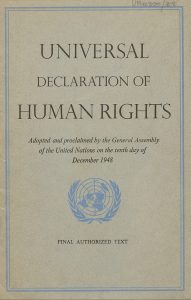According to the United Nations, human rights apply to all humans regardless of sex, ethnicity, race, nationality, language, religion and other statuses.
In a world where cases of human rights abuses are reported every day, the application of the law to protect people who are subjected to different forms of abuse becomes critical. However, such would be a difficult feat without understanding the relationship between humanitarian law (HL) and human rights (HR). It is also noteworthy that humanitarian law is one of the main branches of legal studies that students take in different higher learning institutions. It is especially the case for learners looking to scale their legal practice at the international level, leading human rights causes alongside rights activities in courts and streets. Beginner humanitarian law students who want to learn about this can, therefore, request an original paper on factors contributing to the abuse of people’s rights in different parts of the world.
In this post, we look at the relationship between humanitarian law and human rights, so let’s dive in to learn more.
Understanding of Human Rights Directly Impacts Humanitarian Law Studies
In almost every school around the world, students learn about human rights. It is usually the case in high (secondary) schools before proceeding to specialize in humanitarian law studies in higher learning institutions. According to the United Nations, human rights apply to all humans regardless of sex, ethnicity, race, nationality, language, religion and other statuses. They include the right to liberty, right to life, freedom of expression/opinion, freedom from torture/slavery, right to education, work and many others without any form of discrimination.

Understanding the above gives rise to humanitarian legal practice, something the UN charter on human rights defines as International Human Rights law. It spells out the obligations of governments, especially when it comes to acting in ways that may violate or abrogate the rights and freedoms of people. The United Nations Declaration of Human Rights has further contributed to understanding how it relates to humanitarian law.
Both Are Established Through a Treaty/Custom
Unlike constitutional laws established through popular opinion such as plebiscite, humanitarian law and human rights are both established through a treaty/custom. Let’s quickly look at both on the premise of their definitions to get a clear picture.
Humanitarian Law
Humanitarian laws refer to rules applicable at international levels and most importantly, established through custom or treaty. It is noteworthy that the purpose of this law is to help solve crimes such as armed border conflicts, whether international or not. Usually, conflicts that invite the application of humanitarian law triggers humanitarian concerns such as abuse of the right to life and liberty.
Human Rights
On the other hand, human rights refer to international rules established through a treaty or custom applicable to individuals by their respective governments. Like humanitarian law, human rights laws help citizens claim their rights and certain benefits from respective governments.
Riding on the above definition, the common denominator is that humanitarian law and human rights apply to situations where citizens face threats of rights abuse, either because the government fails to grant such rights or dues to armed conflicts.
A Breach of Humanitarian Law Triggers Violation of Human Rights and Vice Versa
Next, let’s look at the relationship between the two terms, especially how a breach of humanitarian law contributes to a violation of human rights. Take, for example, a situation where armed conflict leads to loss of life. It means a violation of human rights and a breach of international humanitarian law would have taken place concurrently.
Final Thoughts
Rising cases of human rights abuses invite the application of humanitarian law. However, different sections apply to different situations. Consider crises such as armed conflicts and wars that often lead to the forceful displacement of people and mass murders. The international criminal court (ICC) epitomizes the application of humanitarian law and human rights.


Join the conversation!